Treatment with the help of the patient’s own information
in the BICOM® mobile VET bioresonance device
In contrast to other “frequency therapy devices”, BICOM® bioresonance is a method that is highly individual and perfectly tailored to the needs of the patient through the use of the patient’s own information and the possibility of testing specific wave patterns for resonance.
The patient’s own pathological and physiological information is recorded using special applicators and fed into the BICOM® mobile VET.
Depending on the therapy program, the specific wave pattern as a carrier of information is amplified, weakened or inverted and transmitted back to the patient in modulated form, which means that the transmission of information changes in clarity depending on the modulation or it disappears completely.
The treatment signals continuously adapt to the changing pathological situation of the patient. As the therapy progresses, the body’s ability to regulate is reactivated.
Find out more about this topic at our regular events. Together with veterinarians and animal naturopaths, we offer various face-to-face and online events .
The BICOM® bioresonance method is a cause-oriented, holistic treatment concept. It can narrow down the cause of the health problem in animals and find out even the hidden causes of the clinical picture.
Animals have a natural regulatory system that can also compensate for unusual influences. However, even good self-healing powers eventually reach their limits. Persistent exposure to allergens, environmental toxins, fungi, viruses, bacteria or stress and changed living conditions weaken the immune system and are often the cause of an illness. In particular, fungal infestation on the skin or chronic diseases in general are not always due to a breeding-related genetic defect, but are signs of a disturbed immune system.
The BICOM® bioresonance method is the key to successful diagnosis and therapy, especially for animals that cannot tell us exactly where it hurts or what the symptoms are. It is a gentle form of therapy that can be carried out without side effects and without additional stress for the animal.
The BICOM® mobile VET records the bioenergetic state of the animal, processes the information it contains and returns modified vibrations / therapy frequency patterns to the animal. Symptoms and stress can be diagnosed and targeted therapy can be initiated.
Through the use of endogenous and exogenous substances, the body’s own self-healing powers can be activated and imbalances that have existed for a long time can also be regulated.
REGUMED Medizintechnik are pioneers of the BICOM® bioresonance method. More than 30,000 therapists worldwide, well over 10,000 of them in Germany, successfully use their therapy concept.
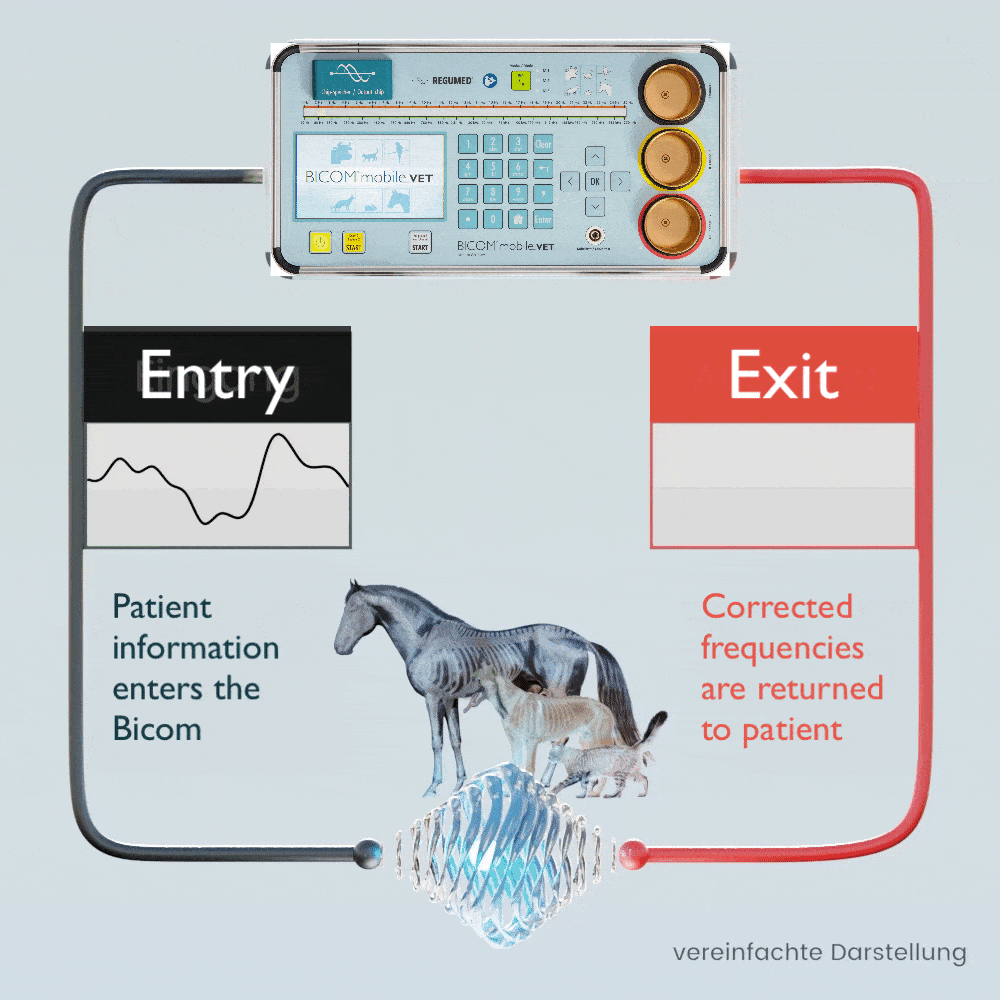
Biophysical basics of the bioresonance method
Life is only possible when three conditions are met: matter, energy and information.
We also find these aspects in conventional medicine, both in diagnostics and in therapy. For example, every drug is also a carrier of information.
Information is neither energy nor matter, it is immaterial and comparable to the meaning of a message from a sending to a receiving system.
In addition to the electrical processes in the receptor proteins and biomembranes in general, electromagnetic interactions through light (biophotons) also play a role in cell communication and the transmission of information.
Specific electromagnetic wave patterns act as information carriers. These wave patterns can be modulated by the BICOM® device in order to eliminate disturbing or stressful information in an organism.
The goal is to restore the free flow of healing information (cell communication) and thus support the self-regulation of the organism and the self-healing powers.
Individual, patient-specific information or information from native substances, digitized substances or information stored on storage media can be used for therapy.
What your colleagues are saying…

Best Exotic Vet Near Me – Expert Care for Unique Pets
Finding the Best Exotic Vet Near Me: What Every Pet Owner Should Know
Why You Need a Specialized Exotic Vet Near Me
Exotic pets, such as reptiles, birds, amphibians, and small mammals, require specialized veterinary care that differs significantly from traditional pet clinics. Unlike cats and dogs, these unique animals have specialized diets, distinct anatomical structures, and different physiological needs. Many general veterinarians are not trained to diagnose or treat conditions in exotic pets, which is why finding the best exotic vet near me is essential for ensuring their long-term health and well-being.
These animals often hide signs of illness, a survival instinct that makes it difficult for owners to recognize health issues early. Without proper care, minor conditions can quickly escalate into life-threatening problems. That is why having a trusted exotic veterinarian is crucial for proactive pet care.
The Importance of Proper Habitat Setup for Exotic Pets
One of the most overlooked aspects of exotic pet care is the importance of a properly designed habitat. Many health issues in reptiles, birds, and small mammals arise due to inadequate housing conditions. Temperature, humidity, lighting, and enclosure size all play a crucial role in an exotic pet’s well-being.
For example, reptiles require specific UVB lighting to metabolize calcium properly and prevent metabolic bone disease. Birds need ample space for movement, as small cages can lead to stress-related behaviors such as feather plucking. Small mammals like guinea pigs and rabbits require sufficient floor space and proper bedding to prevent joint issues and respiratory infections.
What Makes an Exotic Vet Different from a General Vet?
A veterinarian specializing in exotic pets undergoes additional training beyond standard veterinary education. They are knowledgeable in treating a wide range of non-traditional pets, including reptiles, amphibians, birds, and small mammals like guinea pigs, hedgehogs, and chinchillas. Some key differences between a general vet and an exotic vet include:
Species-Specific Diet Knowledge – Exotic pets require carefully balanced diets to prevent nutritional deficiencies. An exotic vet understands the precise dietary needs of each species and can provide recommendations to optimize health.
Understanding of Unique Physiology – Birds have delicate respiratory systems, reptiles require external heat regulation and small mammals have sensitive digestive systems. An experienced exotic vet can assess health conditions specific to each type of pet.
Specialized Equipment and Treatments – Exotic pets require diagnostic tools and treatments that are not typically available at general veterinary clinics. For example, an exotic vet can perform beak trims for birds, shell repairs for turtles, and dental procedures for rabbits and guinea pigs.
Signs Your Exotic Pet Needs Immediate Veterinary Care
Exotic pets are skilled at hiding signs of illness, making it essential for pet owners to monitor for subtle changes in behavior or appearance. Here are some key indicators that signal a need for immediate veterinary attention:
1. Loss of Appetite
A sudden decrease in food consumption can indicate an underlying health issue. Birds, reptiles, and small mammals can experience appetite loss due to infections, stress, or digestive problems. If your pet refuses food for more than 24 hours, a veterinary visit is necessary.
2. Lethargy or Unusual Behavior
A normally active pet that suddenly becomes lethargic, hides excessively, or displays aggression may be experiencing illness or discomfort. Behavioral changes can be an early warning sign of stress or a developing medical condition.
3. Labored Breathing
Respiratory distress in exotic pets is often serious and requires urgent veterinary care. Open-mouth breathing, wheezing, nasal discharge, or clicking sounds in birds and reptiles should never be ignored.
4. Changes in Skin, Feathers, or Fur
Unusual shedding, feather plucking, dry skin, or abnormal color changes can indicate parasites, infections, or nutritional deficiencies. A veterinarian can diagnose the issue and recommend appropriate treatment.
5. Abnormal Stool or Urine
Diarrhea, constipation, or discolored droppings are common indicators of health problems. In reptiles, abnormal urate (the white portion of waste) may signal kidney disease or dehydration.
How to Choose the Best Exotic Vet Near Me
Finding the right exotic vet requires careful consideration. Not all veterinary clinics are equipped to handle exotic pets, so it is important to evaluate key factors before making a decision.
1. Verify Qualifications and Experience
A qualified exotic veterinarian should have specific training in exotic animal medicine. Look for certifications, continuing education in exotic pet care, and experience treating your specific type of pet.
2. Assess Clinic Facilities and Equipment
The best exotic vets have specialized tools and diagnostic equipment, including reptile incubators, avian X-ray machines, and small-animal surgical instruments. Check if the clinic has the necessary technology to handle exotic pet emergencies.
3. Availability of Emergency Services
Many exotic pets require immediate medical attention when they fall ill. Find out if the vet offers after-hours or emergency services to ensure your pet can receive urgent care when needed.
4. Read Client Reviews and Testimonials
Check online reviews from other exotic pet owners to gauge the quality of care provided by the vet. Personal recommendations from reptiles, birds, or small mammal communities can also be valuable.
5. Evaluate the Vet’s Approach to Exotic Pet Care
A good exotic vet should be patient, knowledgeable, and willing to educate pet owners on proper care, diet, and habitat requirements. The best veterinarians take the time to explain diagnoses and treatment options clearly.
Common Health Issues in Exotic Pets & How a Vet Can Help
Reptiles: Metabolic Bone Disease (MBD)
Many reptiles suffer from metabolic bone disease due to calcium deficiencies and inadequate UVB lighting. Without proper bone development, lizards and turtles can develop deformities and mobility issues. An exotic vet can diagnose and treat MBD with calcium supplements, dietary adjustments, and improved lighting recommendations.
Birds: Respiratory Infections
Birds have highly sensitive respiratory systems and are prone to infections caused by poor ventilation, smoke exposure, or bacterial infections. A veterinarian can diagnose respiratory issues early and provide antibiotics or environmental adjustments to improve air quality.
Small Mammals: Dental Overgrowth
Rabbits, guinea pigs, and chinchillas have continuously growing teeth, which can lead to eating difficulties if not properly managed. Regular dental exams by an exotic vet can prevent painful overgrowth and ensure proper nutrition.
How Often Should Exotic Pets Visit the Vet?
Exotic pets require at least one wellness exam per year, but certain species may need more frequent visits. Regular check-ups allow veterinarians to detect potential health issues before they become serious.
Reptiles: Every 6-12 months
Birds: Every 6-12 months
Small Mammals: Every 6 months
Early detection of illness is crucial for exotic pets since they often mask symptoms until the condition becomes severe.
What to Expect During an Exotic Pet Vet Visit
A typical exotic pet examination includes:
Full Physical Exam – Checking weight, hydration levels, and overall body condition.
Dietary Assessment – Ensuring the pet is receiving proper nutrition based on its species.
Behavioral Analysis – Identifying any changes in behavior that may indicate stress or illness.
Diagnostic Testing – Blood tests, X-rays, or stool analysis to detect hidden diseases.
Preventative Care Advice – Guidance on proper housing, humidity levels, and environmental enrichment.
Preventative Care: How to Keep Your Exotic Pet Healthy
Preventative care is essential to avoid common illnesses in exotic pets. Unlike cats and dogs, many exotic animals do not require annual vaccinations, but they do need routine health screenings to detect underlying issues before they become severe.
Some key preventative measures include:
Routine Check-Ups – Annual or biannual vet visits help identify early signs of illness.
Proper Nutrition – Feeding a species-appropriate diet prevents malnutrition and digestive disorders.
Environmental Hygiene – Regular cleaning of cages, terrariums, and bedding reduces the risk of infections.
Parasite Prevention – Some exotic pets, such as reptiles, are prone to mites and internal parasites. Regular screenings ensure early detection and treatment.
By taking a proactive approach to your pet’s health, you can reduce the risk of serious medical issues and ensure they live a long and happy life.
Conclusion
Finding a trusted exotic vet near me is crucial for keeping your unique pet healthy and happy. Unlike traditional pets, exotic animals require specialized veterinary care tailored to their unique needs. Whether you own a reptile, bird, or small mammal, regular vet visits ensure early detection of potential health issues and proper preventative care.
Do not wait until an emergency arises—schedule a wellness check-up with an experienced exotic vet today to ensure your pet receives expert care for a long and healthy life.
FAQs
1. What qualifies a vet as an exotic pet specialist?
An exotic pet vet has specialized training and experience in treating animals like reptiles, birds, and small mammals. They understand unique species-specific needs.
2. How often should exotic pets see a vet?
Most exotic pets should have a check-up at least once a year. Some species, like reptiles and birds, may need more frequent visits based on their health.
3. What are common signs of illness in exotic pets?
Lethargy, loss of appetite, unusual behavior, and difficulty breathing can indicate illness. Early vet intervention is crucial for proper treatment.
4. What should I feed my exotic pet?
Each exotic pet has specific dietary needs. Consult a vet to ensure they receive the right balance of nutrients for their species.
5. How can I make my exotic pet comfortable at home?
Provide a habitat that mimics their natural environment, including proper temperature, humidity, and lighting conditions tailored to their species.
6. Do exotic pets need vaccinations?
Most exotic pets do not require vaccines, but regular health checks help prevent diseases. Some may need parasite control treatments.
7. How can I tell if my exotic pet is stressed?
Hiding, excessive aggression, reduced appetite, and repetitive behaviors are common signs of stress in exotic pets. A vet can help address the cause.
8. What should I do if my exotic pet stops eating?
A sudden loss of appetite could indicate illness. Seek veterinary care immediately to diagnose and treat potential health problems.
9. How can I prevent common diseases in exotic pets?
Maintaining proper hygiene, providing a balanced diet, and scheduling regular vet visits can help prevent many common illnesses in exotic pets.
10. What should I do in an emergency with my exotic pet?
Contact an exotic pet vet immediately if your pet shows severe distress, difficulty breathing, or injury. Quick action can save their life.
Treatment Priorities
For gentle and optimal treatment of the causes of diseases in animals
The BICOM® bioresonance method is predestined for use with large and farm animals such as horses , but also with dogs , cats and small animals. The treatment focus of the BICOM® mobile VET is wide-ranging. It is now used for many indications.
It recognises health deficits at an early stage and is used, among other things, for the following symptoms:
sweet itch
Feed intolerances
allergies and related diseases
COB/COPD
leishmaniasis
Lyme disease
anaplasmosis
lameness in horses
hoof ulcer
Poisoning by poisoned baits, plants etc.
mauke
Feline infectious peritonitis (FIP)
Cat flu/cat disease
eye/conjunctivitis
and much more
Get advice now!
Our experts are happy to be there for you personally
Our BICOM® bioresonance experts are available to answer any questions you may have
and will be happy to advise you personally and individually.

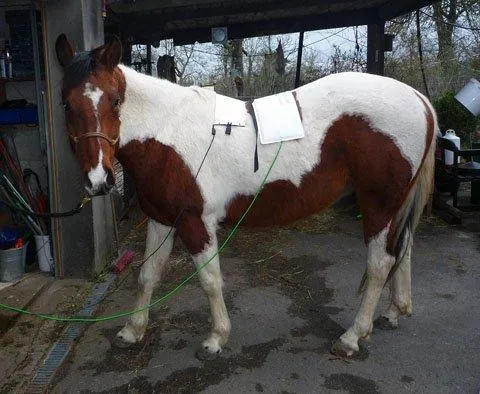
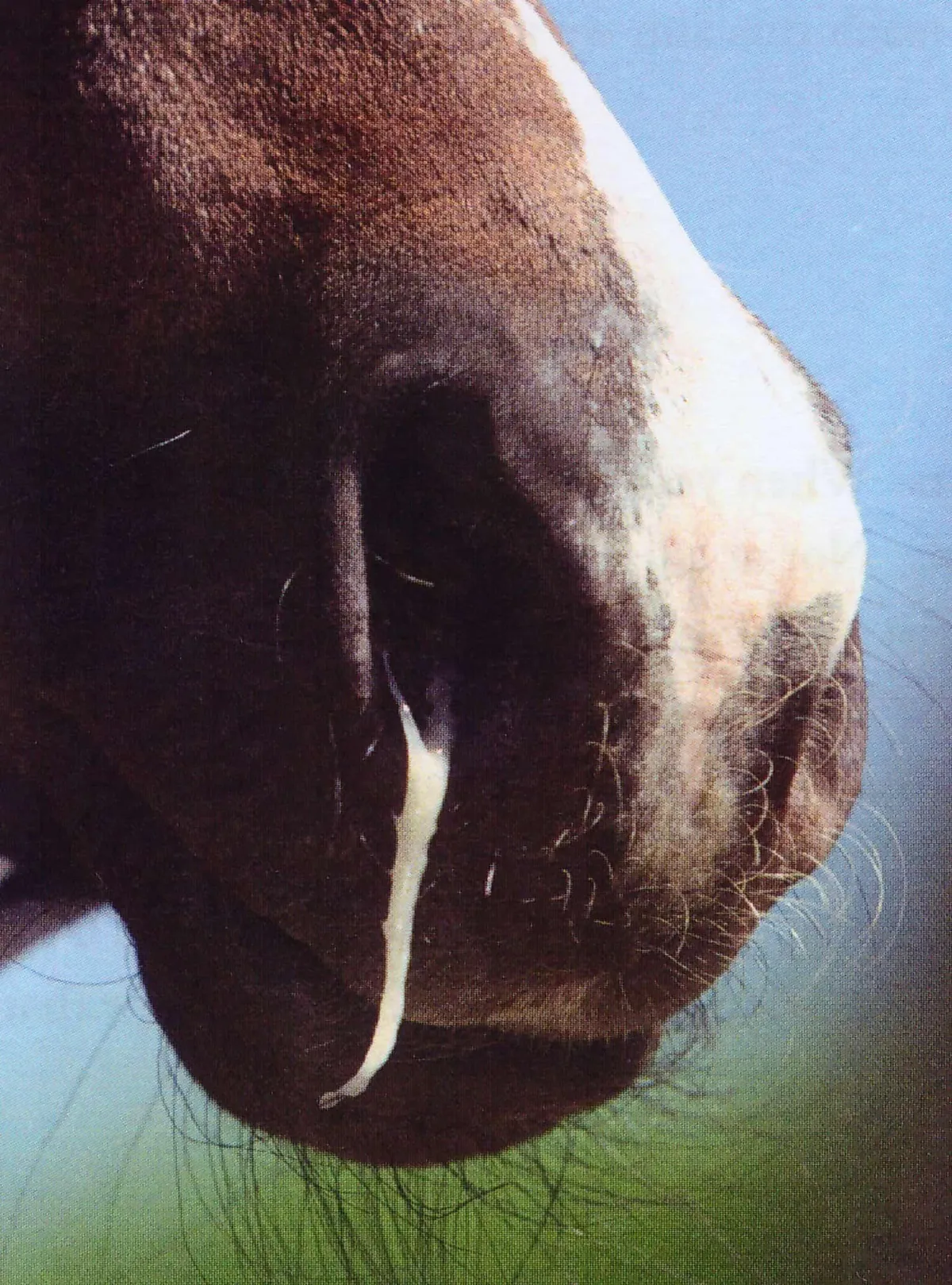

Request more information
Quick Links

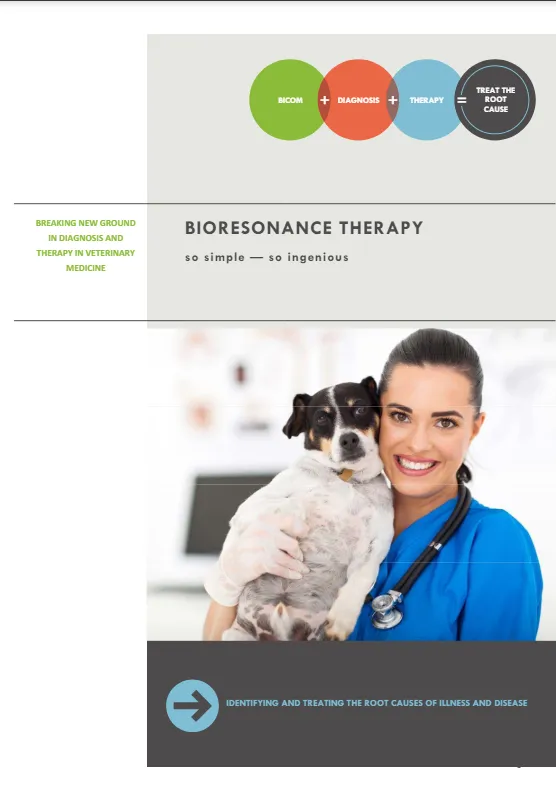
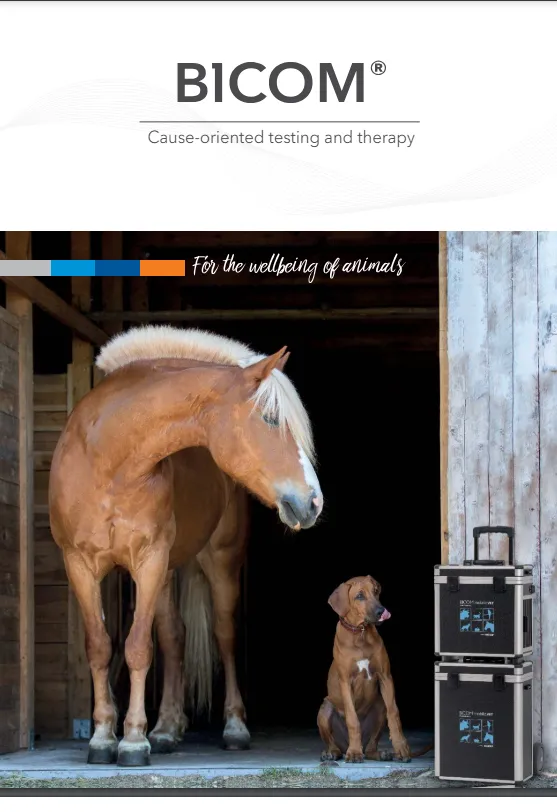


Facebook
Instagram
Mail